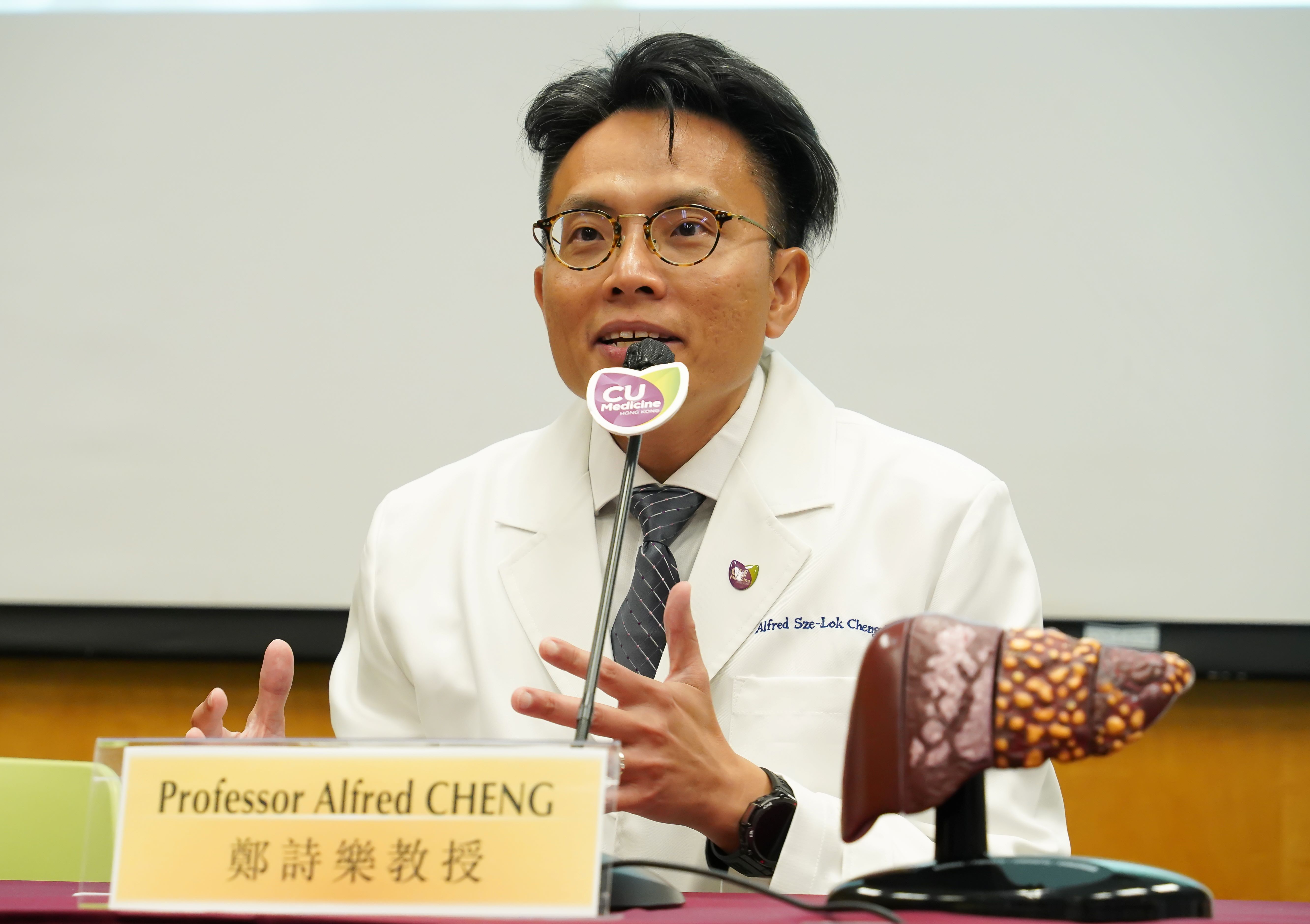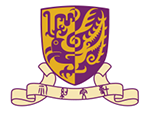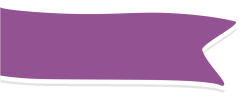Professor Alfred Cheng Sze-lok’s research team uncovers the keys for liver cancer adaptation to immunotherapy, pioneering new combination therapy in a Phase II clinical trial
Liver cancer remains one of the most common cancers in the world. Recent research from CUHK’s Faculty of Medicine has discovered how liver cancer cells adapt to immunotherapy, the most advanced therapy for cancer patients. The team comprising the School of Biomedical Sciences (SBS) members Prof. Alfred Cheng Sze-lok, Professor; Prof. Zhou Jingying, Assistant Professor and Dr. Xiong Zhewen, Postdoctoral Fellow and other researchers empowered immunotherapy by counteracting the resistance mechanisms of cancer cells and confirmed their clinical potential in liver cancer animal models. Research results have been published in the leading international journal Gut, which can be viewed HERE. The team is also going to commence a new Phase II clinical trial of combination immunotherapy (NCT05873244), aiming to translate the discovery into patient benefits.
Recently, immunotherapy has increasingly been given to patients in the clinic. However, checkpoint inhibitors, the most used immunotherapy in liver cancer, can only benefit approximately 20% of patients. Moreover, patients who initially respond can become resistant during treatment.
Immunotherapy-resistant liver cancer patients are associated with an immunosuppressive cold tumour microenvironment. However, the animal models commonly used in the laboratory do not reflect the complex organ-specific aspects of tumour development. Advances in modelling dynamic tumour-immune interactions are therefore critical to understand resistance mechanisms and improve immunotherapy. The new clinically relevant mouse models are instrumental in identifying and verifying actionable targets for therapeutic interventions. The team has further used their new mouse models to demonstrate the effectiveness and safety of a novel class-I HDAC drug in combination with checkpoint inhibitors.
The related coverage by the Communications and Public Relations Office, CUHK and CU Medicine can be viewed HERE and HERE respectively, whereas a report by TVB can be found HERE.

(From left) Dr Xiong Zhewen, Postdoctoral Fellow; Prof. Alfred Cheng Sze-lok, Professor; Prof. Stephen Chan, Professor of the Department of Clinical Oncology; and Prof. Zhou Jingying, Assistant Professor

Prof. Alfred Cheng Sze-lok explains that using the latest single-cell sequencing technology, the research team was able to discover new molecular pathways by which liver cancer cells circumvent the therapy-armed immune system. The team further developed roadblocks and successfully eliminated the cancer cells through combination immunotherapy.
肝癌是世界上最常見的癌症之一。香港中文大學(中大)醫學院最近的研究揭示肝癌細胞能「適應」免疫療法,令這種目前最先進的癌症療法失效。生物醫學學院成員鄭詩樂教授、博士後研究員熊哲文博士及助理教授周京穎教授包括在內的研究團隊針對癌細胞的耐藥機制,成功增強了免疫治療的功效,並在肝癌動物模型上證實了其臨床潛力。研究成果已在國際權威雜誌《Gut》上發表,論文全文可按此處參閱。另外,團隊亦將開展嶄新的「聯合免疫療法」二期臨床試驗(NCT05873244),旨在將研究成果轉化為臨床治療,造福病人。
近年,愈來愈多患者接受臨床免疫治療,其中「免疫檢查點抑制劑」是肝癌最常用的免疫療法,但只對約20%的患者有作用。患者更有可能在治療過程中出現耐藥性。
肝癌患者對免疫治療出現耐藥性的成因主要與免疫抑制的「冷」腫瘤微環境有關。然而,實驗室常用的動物模型並不能反映腫瘤發展的複雜器官特異性。因此,透過能反映腫瘤和免疫系統互動的先進生物模型來理解耐藥機制,對改善免疫治療至關重要。新建的小鼠模型有助識別和驗證可行的治療目標,團隊並進一步利用他們的新小鼠模型來證明新型I類HDAC藥物與「免疫檢查點抑製劑」聯合使用的有效性和安全性。
中大傳訊及公共關係處的有關報導請按此處瀏覽;而中大醫學院的報導可按此瀏覽。無線新聞的有關報導請按此處瀏覽。

(左起)博士後研究員熊哲文博士、鄭詩樂教授、腫瘤學系陳林教授,以及助理教授周京穎教授

鄭詩樂教授解釋,研究團隊利用最新的單細胞測序技術,發現肝癌細胞繞過免疫治療的新分子途徑後,進一步設置了「路障」,通過聯合免疫療法成功消除癌細胞。
肝癌是世界上最常见的癌症之一。香港中文大学(中大)医学院最近的研究揭示肝癌细胞能「适应」免疫疗法,令这种目前最先进的癌症疗法失效。生物医学学院成员郑诗乐教授、博士后研究员熊哲文博士及助理教授周京颖教授包括在内的研究团队针对癌细胞的耐药机制,成功增强了免疫治疗的功效,并在肝癌动物模型上证实了其临床潜力。研究成果已在国际权威杂志《Gut》上发表,论文全文可按此处参阅。另外,团队亦将开展崭新的「联合免疫疗法」二期临床试验(NCT05873244),旨在将研究成果转化为临床治疗,造福病人。
近年,愈来愈多患者接受临床免疫治疗,其中「免疫检查点抑制剂」是肝癌最常用的免疫疗法,但只对约20%的患者有作用。患者更有可能在治疗过程中出现耐药性。
肝癌患者对免疫治疗出现耐药性的成因主要与免疫抑制的「冷」肿瘤微环境有关。然而,实验室常用的动物模型并不能反映肿瘤发展的复杂器官特异性。因此,透过能反映肿瘤和免疫系统互动的先进生物模型来理解耐药机制,对改善免疫治疗至关重要。新建的小鼠模型有助识别和验证可行的治疗目标,团队并进一步利用他们的新小鼠模型来证明新型I类HDAC药物与「免疫检查点抑制剂」联合使用的有效性和安全性。
中大传讯及公共关系处的有关报导请按此处浏览;而中大医学院的报导可按此浏览。无线新闻的有关报导请按此处浏览。

(左起)博士后研究员熊哲文博士、郑诗乐教授、肿瘤学系陈林教授,以及助理教授周京颖教授

郑诗乐教授解释,研究团队利用最新的单细胞测序技术,发现肝癌细胞绕过免疫治疗的新分子途径后,进一步设置了「路障」,通过联合免疫疗法成功消除癌细胞。



